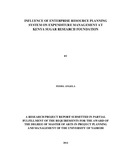| dc.description.abstract | A central pillar of the government’s governance and anti-corruption strategy is the reform
of the internal management of public resources and administration aimed at reducing the
opportunity and incentives for corruption. Kenya Sugar Research Foundation (KESREF)
acquired a Microsoft Dynamics NAV enterprise resource planning system in 2009 to
automate all its transactions. Prior to automation, there were stand-alone conventional
systems that were prone to manipulation, financial malpractices and improprieties.
However, since automation, the system was yet to be assessed to establish whether it had
efficiently addressed those challenges. The purpose of this research was to establish the
influence of Enterprise Resource Planning system on Expenditure Management at
KESREF. The study adopted a descriptive survey design with a target population of 100
employees of KESREF. Data was collected using questionnaires which were structured
in two sections and were self administered. The study realized a return rate of 83%.
Data was categorized into themes, analyzed using simple statistics by SPSS 17.0 and
Microsoft excel software and relevant interpretations and conclusions drawn. The study
established that there was a significant influence of ERP system on budget allocation
efficiency at 73%, while budget utilization based on strategic priorities at 64% and on
fiscal discipline at 83%. The second objective on examining how ERP system influences
control of expenditure on subsistence allowances, the study found that KESREF was
rated at 77% and at 75% on existence of loopholes that allowed the abuse of the same
whereas on controls put in place to ensure that surrenders were done on subsistence
allowances the rating was at 52%. This was a clear indication much efforts are required
to improve on existing controls. On the third objective on establishing how ERP system
influences accountability of resources the study found that the rating on ERP
enhancement of activity-based costing is at 80%, improvement on accountability of
financial resources was at 84% and centralization of approvals was rated highly at 88%.
On the forth objective on assessing how ERP system influences access to financial
information the study found that on accuracy of data on resource allocated to staff the
rating was at 70%, while on reliability of the information generated from the system the
rating was at 80%. However, on reducing reporting lags for auditing purposes, the rating
was at 52% which was fairly low. Finally, on the organization culture, it was established
that majority 71% of the respondents viewed organization culture to be unhealthy
because of abuse of subsistence allowances and subsequently exaggerated travelling
reimbursements on fares and taxi. Though abuse of subsistence allowance had been
controlled, there was need to have controls on fares and taxi reimbursements.
Considering other components, the culture had changed as a result of ERP system. The
study met all the four set objectives. The study recommends further research on other
areas of expenditure other than subsistence allowance. It is also suggested that a study be
done to assess effects of the ERP system as this study majorly looked at the influence of
the ERP system, hence there was no correlation to determine the effects. The study’s
contribution to the body of knowledge is that Key success factors are fundamental to the
successful implementation of the ERP system hence they should be carefully taken into
consideration in the entire process. Secondly, it is important that continuous monitoring
and evaluation of ERP systems is done to ensure loopholes are sealed and finally, that an
ERP system if well implemented, is a very useful tool in expenditure management that
would help in planning, budgeting, utilization and accounting for the resources. | en_US |

